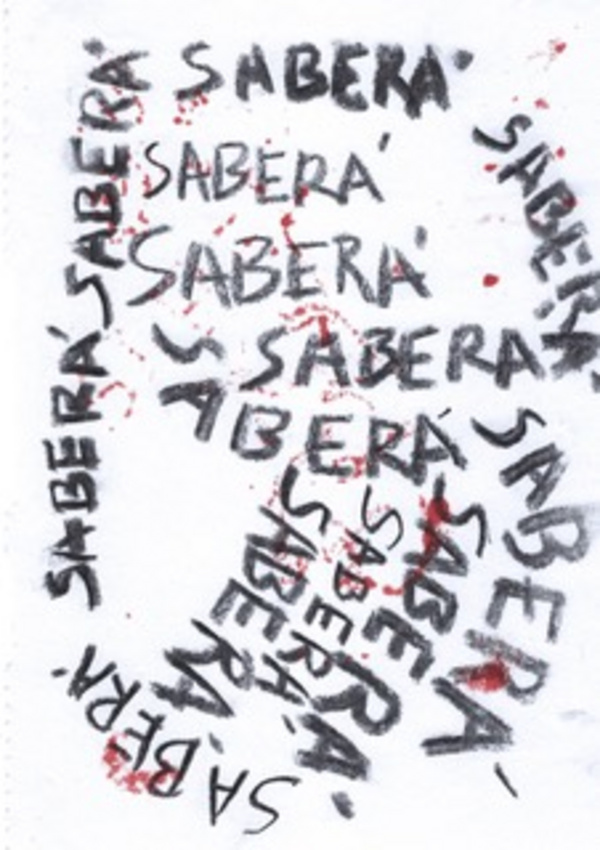 Foto: Jota Mombaça, project draft n73 (the daughters of the driest rain), 2020. Courtesy the artist
cacophonic cliniX
28.11.2020 - 3pm to 6pm
Digital performative study session by Jota Mombaça
Curated by Juana Awad
In English
The workshop is free, but registration is necessary. Prior to the session all participants will receive a link to the online conference tool, as well as reading material for preparation. Limited capacity: first come first served! Please registe until Nov. 21 by writing an email to feministmagiX@hgb-leipzig.de.
What hearing procedures define the scope of colonial listening politics, and how to dismantle its sonic constraints?
This performative study session will focus on cacophony and multi-vocality as strategies of dissident convergence. At the centre of the collective reading endeavour lie speculative fictions and histories of encounters with fire: the turning into ashes of archives, of bodies, of forests, of buildings, of that and those that cannot be controlled, but also, burning as communal practice and ritual of rebirth. Using the body as repository of knowledge, and listening in its transformative potential, we will reckon with the agency of fire while resting on its ambivalence. Thought of as heat, the sound of the mixed voices will provide the ground for a non-linear and opaque consideration of the concept of 'destructive care' (Mombaça, 2018) as a tool for the abolition of colonial soundscapes, ethical equations, and epistemologies.
Jota Mombaça (Brazil, 1991) works with poetry, critical theory and performance. The sonic and visual matter of words plays an important role in their practice, which often deals with anti-colonial criticism and gendered disobedience. Through performance, visionary fiction and situational strategies of knowledge production, Mombaça seeks to rehearse the end of the world as we know it and the figuration of what comes after we have driven the modern-colonial subject from its podium. Their work has been shown in various international contexts including the Biennale of Sidney, House of World Cultures, HAU Hebbel am Ufer, Salon Nacional de Artistas de Colombia, BAK Utrecht, PACT Zollverein, Matadero Madrid, Public Programm 10th Berlin Biennale.
In the context of Feminist MagiX. Decolonial Inlets curated by Katrin Köppert with Nathalie Anguezomo Mba Bikoro, Juana Awad, Verena Melgarejo Weinandt and MELT (Loren Britton & Isabel Paehr).
The event-series "Feminist MagiX. Decolonial Inlets" accompanies the exhibition "Disturbance: witch" curated by Alba D'Urbano and Olga Vostretsova at the Zentrum für Aktuelle Kunst (ZAK) in the Zitadelle Spandau Berlin. Starting out from the motif of the witch, which is the subject of artistic negotiation in the exhibition, the series of events explores queer-feminist politics and practices of enchantment, which are currently virulent in the context of popular cultural and and feuilletonist discourses.In the context of these discourses, references to syncretistic forms of religiosity and spirituality that are connected to decolonial epistemologies of healing are condensed. In addition, references to mythologies and poetologies of the supernatural can be recognized in the context of indigenous struggles against extractivist colonial capitalist regimes. Ritual practices and magic are important points of reference for decolonial approaches to critically question Western knowledge regimes and exercise epistemic disobedience. The speculative and fabulative is also central within Afrofuturism. New concepts and forms of the political come to the fore: Music, dance and performance form decisive bridges to shape the world and determine politics. It is about nothing less than the reestablishment of the world with the means of art and culture.
Funded by
Bundeszentrale für politische Bildung
In cooperation with
Academy for Transcultural Exchange, Academy of Fine Arts Leipzig
Büro für kulturelle Übersetzungen
District Berlin
Gunda Werner Institute for Feminism and Gender Democracy in the Heinrich Böll Foundation
Research Training Group „Knowledge in the Arts”, Berlin University of the Arts
|